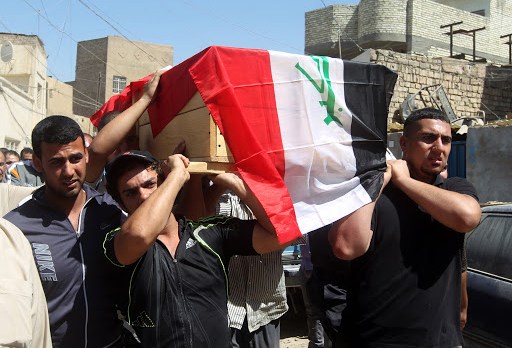The Islamic State of Iraq and Syria (ISIS) has just seized the Iraqi cities of Mosul and Tikrit, and is close to taking control of the nation’s largest oil refinery — indicating that the jihad between Sunni and Shi’ite Muslims is raging hotter now than it has in centuries, and isn’t going to die down anytime soon.
ISIS, a Sunni group, according to the Washington Post now “effectively governs a nation-size tract of territory that stretches from the eastern edge of the Syrian city of Aleppo to Fallujah in western Iraq — and now also includes the northern Iraqi city of Mosul.”
What’s more, it has the resources to outlast its foes in a long conflict. ABC News reports that the jihadists “looted $429 million from Mosul banks, making them richer than some small countries.”
However, Iraq’s Shi’ite Prime Minister, Nouri al-Maliki, has vowed to retake the city, blaming its fall on a “conspiracy” and adding: “Today, the important thing is that we are working to solve the situation. We are making preparations and we are regrouping the armed forces that are in charge of clearing Ninevah from those terrorists.”
Maliki may indeed be able to clear the region of the Sunni jihadists, for behind him stands the power of the Islamic Republic of Iran, which also backs the Alawite Bashar Assad’s regime in Syria. But it is unlikely that they will be able to achieve total victory, for Sunni jihadists from all over the world have flocked to Syria in order to fight against Assad, and Maliki has accused Saudi Arabia and Qatar of supporting the Sunni jihadists in Iraq.
American analysts had naively hoped that both Sunnis and Shi’ite would have been able to put all this behind them. Then-Secretary of State Condoleezza Rice complained in January 2007: “There’s still a tendency to see these things in Sunni-Shia terms. But the Middle East is going to have to overcome that.”
Seven years later, they still haven’t. In fact, the idea that the Sunni-Shi’ite divide, which is 1,400 years old and goes all the way back to the murky origins of Islam, is something that can without undue difficulty be “overcome” is a sterling manifestation of the general superficiality of Washington’s analysis of the Middle East, during both the Bush and the Obama administrations.
Unbeknownst to the analysts and policymakers who have influenced Washington policy for decades now, the Sunni-Shi’ite divide cannot be bridged by negotiations, or by bribes (“aid”), or by anything but the full surrender of one group to the other — which is not going to happen. This is because the divide has enough roots in each side’s differing understandings of Islam for hardliners in both camps to label the other “unbelievers,” and thus people who can lawfully be killed.
Islamic tradition holds that after Muhammad died (which is supposed to have happened in 632 AD), the Muslim community chose his companion Abu Bakr to succeed him as caliph, or successor of Muhammad as the military, political and spiritual leader of the Muslims. But one group among them thought that the leadership belonged by right to Ali ibn Abi Talib, Muhammad’s son-in-law and one of his first followers, and after him to a member of the prophet’s household.
Ali finally did become caliph after Abu Bakr had been succeeded by two other companions of Muhammad, Umar and Uthman, but was assassinated only a few years later. Then in the year 680, his son Hussein was killed in battle with the caliph Yazid I at Karbala in Iraq, and the split between those who believed that the caliph should be the best man in the community (the Sunnis) and those who believed the Muslims should be led by a relative of Muhammad (the Shi’ites) became formal, bitter and everlasting.
There is not much doctrinal difference between the two camps, but since each believes that the other has departed from the truth of Islam, and each (particularly the Shi’ites) nurses centuries-old grudges over ancient wrongs done to them, this split is not going to be “overcome.” Saddam Hussein kept a lid on it in Iraq by brute force, but now that he is gone and a Shi’ite government is in power there, the Sunnis are determined to wrest control back from them, and the Shi’ites and their Iranian patrons are just as determined to keep it.
It is a recipe for endless warfare, until the Mahdi returns and reveals whether he has come as the Sunni or the Shi’ite version. In the meantime, the strength of ISIS, the Shi’ites’ determination to win back the territory they have lost, and the very real possibility that Sunni-Shi’ite war could engulf the entire Middle East, are grim monuments to the price of Washington’s faulty analysis.
Robert Spencer is the director of Jihad Watch and New York Times bestselling author of Arab Winter Comes to America: The Truth About the War We’re In.

